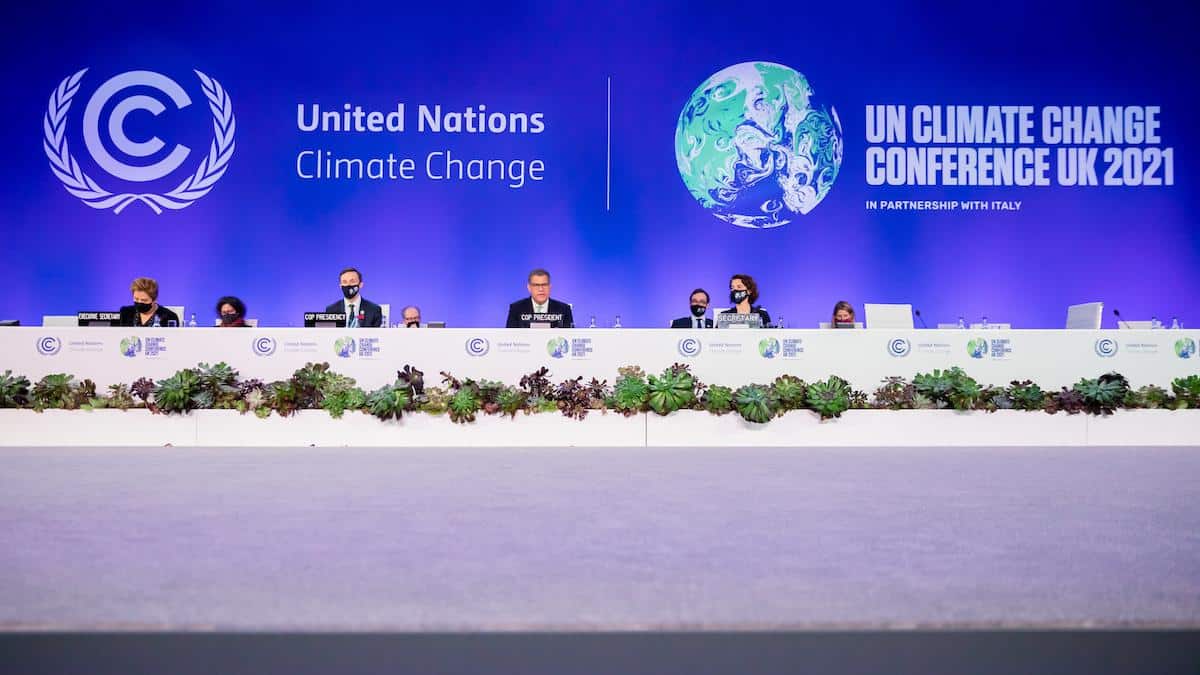
COP26 Ends With Climate Action Falling ‘Short on the Promises Made in Paris’

Alok Sharma (M), president of COP26, speaks on Nov. 13, 2021 in Glasgow. Christoph Soeder / picture alliance via Getty Images
The 26th meeting of the UN climate talks was finally gavelled on Saturday evening in Glasgow, after more than two weeks of intense negotiations.
The Glasgow Climate Pact secured a 2023 timeline for countries to resubmit their national emissions-reduction targets to be more aligned with 1.5°C (2.7°F) of warming, and made an unprecedented mention of fossil fuels and recognition of the need for Just Transition.
Agreement was also reached on carbon markets, with major loopholes closed but still susceptible to bad-faith actors. The U.S., EU, Australia, and other wealthy nations blocked the creation of a fund to compensate vulnerable nations for irreparable loss and damage caused by climate change, tabling it for more discussion next year at COP27, but the issue — long a priority for developing low-emitting nations, some literally disappearing beneath rising seas, least culpable for the climate crisis — got more attention at COP26 than at previous UN talks.
As reported by The Washington Post:
Two weeks of high-profile talks yielded a package that pushes countries to strengthen near-term climate targets and move away from fossil fuels faster. It insists that wealthy countries fulfill a broken promise to help vulnerable nations cope with the rising costs of climate change. And it cracks open the door to future payments developed nations might make for damage already done.
Saturday’s agreement, however, does not achieve the most ambitious goal of the 2015 Paris accord — to limit Earth’s warming to 1.5 degrees Celsius (2.7 Fahrenheit) above preindustrial levels. Instead, delegations left Glasgow with the Earth still on track to blow past that threshold, pushing toward a future of escalating weather crises and irreversible damage to the natural world.
And representatives from hard-hit nations feared that the deal still leaves their people facing an existential threat.
“The difference between 1.5 and 2 degrees is a death sentence for us,” Aminath Shauna, the Maldives’ minister of environment, climate change and technology, told the summit. “What is balanced and pragmatic to other parties will not help the Maldives adapt in time. It will be too late.”
Organizers acknowledged that the hard-fought agreement doesn’t go nearly far enough. But they argued that the progress made here creates a road map to a safer future and “keeps 1.5 alive.”
“We’re all well aware that, collectively, our climate ambition and action to date have fallen short on the promises made in Paris,” Alok Sharma, the British minister of state and president of the Glasgow talks, told delegates Saturday.
For a deeper dive:
Final agreement: The Washington Post, AP, The Guardian, Buzzfeed, Reuters Factbox, Climate Home, The Washington Post, The Wall Street Journal, Bloomberg, Reuters, Axios, CNN, TIME, Grist, Washington Examiner, Bloomberg, FT, FT, POLITICO EU, The Hill, NPR, CNBC, The New York Times, InsideClimate News, AP, Reuters, Yale Environment 360, Vox, The Guardian, The New York Times; Fossil Fuels: NPR; Loopholes and Carbon Markets: Gizmodo, Bloomberg, Thomson Reuters Foundation, Gizmodo, Reuters, S&P Global; Loss and damage: Thomson Reuters Foundation, E&E News, Climate Home, Reuters, POLITICO EU
For more climate change and clean energy news, you can follow Climate Nexus on Twitter and Facebook, sign up for daily Hot News, and visit their news site, Nexus Media News.
- Campaigners Rip New COP26 Draft as a 'Polite Request' for Climate ...
- Logistical Nightmares Hamper COP26 Negotiations - EcoWatch
- U.S. and China Announce Surprise Climate Agreement at COP26 ...
- Indigenous Groups Officially Excluded From COP26, Continue ...

 233k
233k  41k
41k  Subscribe
Subscribe 